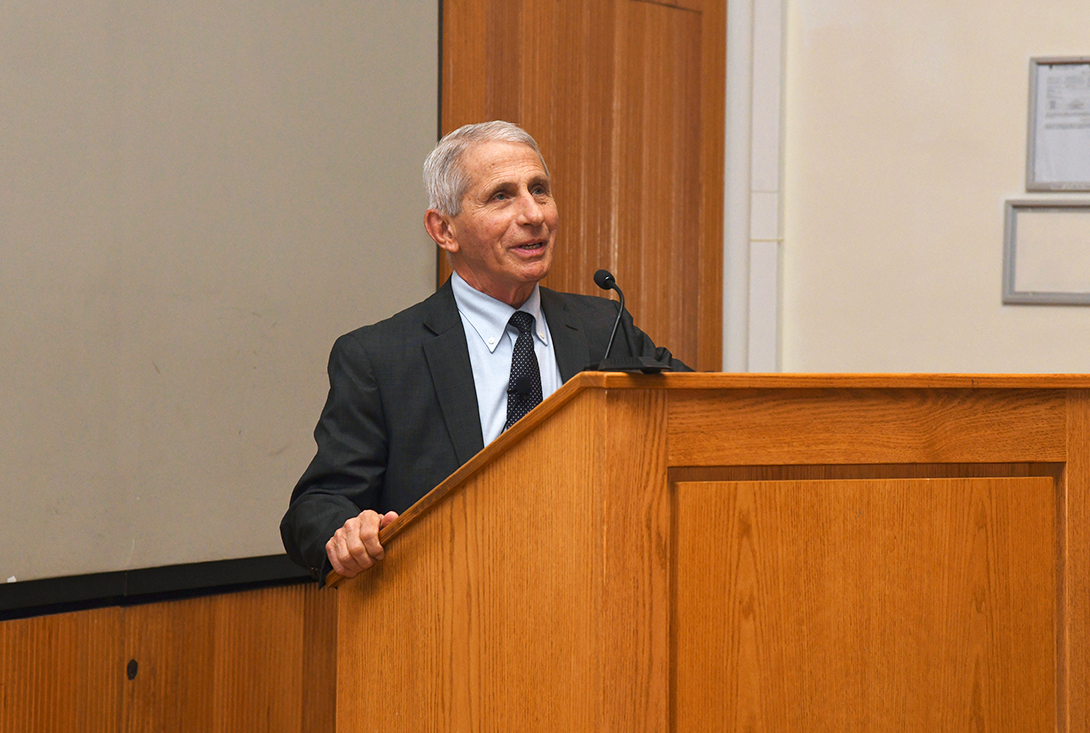Barely noticed scientific advances in the decades before the COVID-19 pandemic proved crucial to rapidly producing vaccines that—despite disappointing national uptake—are estimated to have prevented an additional 3.25 million American deaths from the virus, Dr. Anthony Fauci M.D. ’66 said.
Deftly blending hope and skepticism from serving on the front lines of the pandemic, Dr. Fauci shared 10 lessons from the global health crisis with Weill Cornell Medicine students and faculty on March 29 in a packed Uris Auditorium. His grand rounds presentation was part of the 2023 Ralph L. Nachman, MD Visiting Professorship, sponsored by the Weill Department of Medicine.
High among those insights, he contended, is the importance of ongoing basic, preclinical and clinical research to effectively prepare for and respond to future pandemics. Advances in mRNA technology involved in the most effective COVID-19 vaccines—which were ready for widespread use within 11 months of the pandemic’s start—had quietly been underway long before March 2020.
“It’s mind-boggling to be able to do it that quickly,” said Dr. Fauci, the former director of the National Institute of Allergy and Infectious Diseases (NIAID), who served as chief medical advisor to President Joe Biden from 2021-22. He compared the speed and efficiency of COVID vaccine development to the 47 years needed to develop a polio vaccine and 10 years needed for a measles vaccine. “It was all due to things scientists were doing in their lab 15 or 20 years ago without having an obvious pandemic in mind,” he said.
But unfortunately, the tens of billions of dollars needed to fund future pandemic preparedness measures likely won’t materialize as COVID-19 hospitalizations and deaths steadily drop. “If ever there was an experience that should give us a durable corporate memory, it’s this,” he said. “But I really think our history tells us that, once a challenge is off the radar screen, corporate memory is fleeting.”
Dr. Fauci also urged more attention to the connection between human and animal health and our shared environment. Shutting down or strictly regulating wildlife markets and trade is a key tactic to lower the risk of cross-species infections that could fuel future outbreaks, he said.
“About 75 percent or more of new and emerging infections are zoonotic, meaning they jump from an animal species to a human,” he said. “Obviously, we still need to keep an open mind as to how [SARS-CoV-2] evolved, but rather strong evidence suggests—if not definitively proves—the origin was from a wet market in Wuhan, and recent data about the mix of DNA from animals with the RNA of the virus makes that more compelling.”
Calling prolific misinformation “the enemy of pandemic control,” Dr. Fauci noted that anti-vaccine activists and science deniers can’t be legally suppressed. But “the minority of people spreading false information seem to do it with a degree of energy” that can sometimes override truth, he said. “The only way I think you can counter misinformation is to flood the system with correct information.”
“You can address a perpetual challenge by being perpetually prepared,” Dr. Fauci concluded to a standing ovation. “To me, that’s the overarching message of SARS-CoV-2.”

